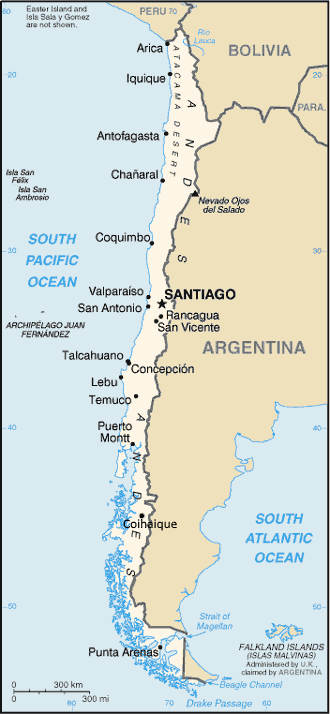|
Nogales, Chile
Nogales () is a city and commune in the Quillota Province of central Chile's fifth region of Valparaíso. Geography The commune of Nogales spans an area of . Demographics According to the 2002 census of the National Statistics Institute, Nogales has 21,633 inhabitants (10,786 men and 10,847 women). Of these, 18,698 (86.4%) lived in urban areas and 2,935 (13.6%) in rural areas. The population grew by 15.9% (2,964 persons) between the 1992 and 2002 censuses. Administration As a commune, Nogales is a third-level administrative division of Chile, administered by a communal council (''consejo comunal''), which is headed by a directly elected alcalde. The current alcalde is Óscar Cortés Puebla ( PDC). The communal council has the following members: * Juan Rivera ( PC) * Oscar Mena (Independent) * Jorge Gómez ( RN) * Josué Godoy ( PS) * Jaime Lineros ( PRSD) * Nelson Verdejo ( PPD) Within the electoral divisions of Chile, Nogales is represented in the Chamber of Deputies by ... [...More Info...] [...Related Items...] OR: [Wikipedia] [Google] [Baidu] |
List Of Cities In Chile
This is a list of cities in Chile. A city is defined by Chile's National Statistics Institute (INE) as an "urban entity"An "urban entity" is defined by Chile's National Statistics Institute as a concentrated group of dwellings with over 2,000 inhabitants, or between 1,001 and 2,000 inhabitants if 50% or more of its population is economically active, dedicated to secondary and/or tertiary activities. Exceptionally, populated centers dedicated to tourism and recreation with over 250 concentrated dwellings and that do not meet the population requirement are considered urban. with more than 5,000 inhabitants. This list is based on a June 2005 report by the INE based on the 2002 census which registered 239 cities across the country. Complete list of cities by region Largest urban agglomerations This list includes conurbations, "absorptions" and cities with over 100,000 inhabitants, according to the 2017 census. {, {, class="wikitable sortable" , - !, !!Urban Entity!!Region!!Po ... [...More Info...] [...Related Items...] OR: [Wikipedia] [Google] [Baidu] |
Rural Area
In general, a rural area or a countryside is a geographic area that is located outside towns and cities. Typical rural areas have a low population density and small settlements. Agricultural areas and areas with forestry typically are described as rural. Different countries have varying definitions of ''rural'' for statistical and administrative purposes. In rural areas, because of their unique economic and social dynamics, and relationship to land-based industry such as agriculture, forestry and resource extraction, the economics are very different from cities and can be subject to boom and bust cycles and vulnerability to extreme weather or natural disasters, such as droughts. These dynamics alongside larger economic forces encouraging to urbanization have led to significant demographic declines, called rural flight, where economic incentives encourage younger populations to go to cities for education and access to jobs, leaving older, less educated and less wealthy popul ... [...More Info...] [...Related Items...] OR: [Wikipedia] [Google] [Baidu] |
Andrea Molina
Andrea Molina Oliva (born 28 March 1970) is a Chilean actress, businesswoman, and politician. Early in her acting career, she gained popularity for her starring role in ''Las historias de Sussi'', a TV series adapted from the film '' Sussi''. She later appeared on the service program ''Hola Andrea'' and ''Mujer, rompe el silencio'', a program that dealt with cases of gender violence. She served as a member of the Chamber of Deputies of Chile for two consecutive terms, from 2010 to 2018. Early life and education Andrea Molina was born in Santiago on 28 March 1970, the daughter of a visual arts professor and a hair and color analyst at the Wella Laboratory. She completed her basic level studies at the Swiss Confederation municipal school, and then received a scholarship from the Swiss School in Santiago. For her intermediate level studies, she attended . Later, she studied bilingual secretarial work at the Instituto Chileno Norteamericano. In 1992, she made her debut as a model on ... [...More Info...] [...Related Items...] OR: [Wikipedia] [Google] [Baidu] |
Christian Democratic Party
__NOTOC__ Christian democratic parties are political parties that seek to apply Christian principles to public policy. The underlying Christian democracy movement emerged in 19th-century Europe, largely under the influence of Catholic social teaching and Neo-Calvinist theology. Christian democracy continues to be influential in Europe and Latin America, though in a number of countries its Christian ethos has been diluted by secularisation. In practice, Christian democracy is often considered centre-right on cultural, social and moral issues, but centre-left "with respect to economic and labor issues, civil rights, and foreign policy" as well as the environment, generally supporting a social market economy. Christian democracy can be seen as either conservative, centrist, or liberal / left of, right of, or center of the mainstream political parties depending on the social and political atmosphere of a given country and the positions held by individual Christian democratic parties. ... [...More Info...] [...Related Items...] OR: [Wikipedia] [Google] [Baidu] |
Chamber Of Deputies Of Chile
The Chamber of Deputies ( es, Cámara de Diputadas y Diputados, links=no) is the lower house of Chile's bicameral Congress. Its organisation and its powers and duties are defined in articles 42 to 59 of Chile's current constitution. Eligibility Deputies must: be aged at least 21; not be disqualified from voting; have finished secondary school or its equivalent; and have lived in the corresponding electoral district for at least two years prior to the election. Electoral system Since 2017, Chile's congress has been elected through open list proportional representation under the D'Hondt method. Before 2017, a unique binomial system was used. These system rewards coalition slates. Each coalition could run two candidates for each electoral district's two Chamber seats. Typically, the two largest coalitions in a district divided the seats, one each, among themselves. Only if the leading coalition ticket out-polls the second-place coalition by a margin of more than two-to-one d ... [...More Info...] [...Related Items...] OR: [Wikipedia] [Google] [Baidu] |


.jpg)